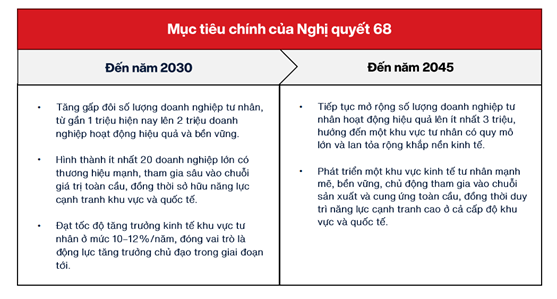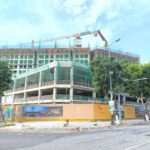Michael Kokalari, Director of Macroeconomic Research and Capital Markets at VinaCapital, offers insightful analysis on the significance of Resolution 68.

Resolution 68 envisions a thriving private sector with rapid, sustainable, high-quality growth and global competitiveness. It aims to not only drive economic growth but also pioneer scientific, technological, and innovative advancements. The long-term goal is to propel Vietnam past the middle-income trap and towards its aspiration of becoming a high-income developed nation by 2045.
A notable feature of the resolution is its ambition to foster the development of 20 large enterprises by 2030, capable of deep integration into global value chains and spearheading industrialization. This model draws inspiration from South Korea’s chaebols, such as Samsung and Hyundai, which have become pillars of their economy. Vietnam anticipates that supporting the efficient operation of large-scale private enterprises will boost innovation, generate high-quality employment, and enhance the economy’s resilience to fluctuations.
In alignment with this direction, this report elucidates three core aspects of the new policy: (1) Incentive mechanisms for the private sector, particularly the strategy to develop large-scale private economic groups modeled after South Korean chaebols; (2) Ensuring equitable treatment between private and state-owned enterprises, establishing a truly level playing field; and (3) Roadmap for state-owned enterprise privatization and restructuring to expand the private sector’s influence.
Accompanying the Government in Propelling the Private Sector Forward
The Vietnamese government recognizes the upcoming decade as a pivotal period to accelerate economic growth before demographic challenges and other objective factors make sustaining high growth rates more difficult. Resolution 68 focuses on comprehensive measures to boost the private sector. During the formulation of Resolution 68, policymakers sought input from various sources, including the Advisory Council for Administrative Procedure Reform under the Prime Minister – Board for Private Sector Development Research (referred to as Board IV), established in 2017.
Don Lam, CEO and co-founder of VinaCapital, currently serves as Vice Chairman of Board IV. Along with other members, he has actively proposed solutions to remove obstacles and bottlenecks for private enterprises in Vietnam. Board IV is tasked with administrative procedure reform, improving the business environment, attracting foreign investment, fostering innovation, and promoting sustainable economic development.
Board IV addresses significant barriers hindering the private sector’s growth, including technological gaps, governance capabilities, and access to finance. Simultaneously, it promotes innovation through reform initiatives and policies encouraging research and development (R&D), aiming to create a more dynamic, technology-oriented, and sustainably developing private sector.
While the private sector currently contributes approximately 50% of Vietnam’s GDP and employs over 80% of the total workforce, it faces resource and capability constraints to realize the government’s goal of propelling the Vietnamese private sector into the top 3 in ASEAN and the top 5 in Asia in innovation, technology, and digital transformation. This remains a significant challenge, despite Vietnam’s abundance of young, talented human resources in STEM fields.
Lastly, Resolution 68 motivates investment funds to increase their investment in the private sector, supporting the government’s objectives. It continues to seek and expand private equity investment opportunities, providing capital for businesses to upgrade technology, expand operations, and boost growth.
Resolution 68: A New Direction for Private Sector Development
The domestic private sector still confronts persistent challenges, such as limited access to capital, cumbersome administrative procedures, and a low level of technology application. Resolution 68 aims to untangle these constraints, targeting a reduction of at least 30% in time, costs, and procedures related to business operations through simplified licensing, reduced compliance burdens, and a shift from pre-inspection to post-inspection for many business lines.
Another salient feature of the resolution is its tax system reform, striving for fairness and business development support. Specifically, by 2026, the government will abolish the tax registration mechanism for household businesses, encouraging them to transition to formal enterprises with more flexible and suitable tax policies. In tandem, local authorities must allocate dedicated land areas – including a portion of each industrial zone – for small and medium-sized enterprises (SMEs) and innovative startups. Additionally, private enterprises will enjoy a 30% reduction in land rental costs during the first five years of their land lease contracts.
Resolution 68 also mandates the formation of specialized credit channels and financial support mechanisms for SMEs, startups, newly established enterprises, and priority areas such as digital transformation and green transition. Measures include interest rate support for loans and leveraging the role of credit guarantee funds. Notably, private enterprises are permitted to allocate up to 20% of their post-tax profits annually to a research and development (R&D) fund and can deduct up to 200% of R&D expenses from taxable income – a breakthrough policy to stimulate innovation investment.
Lastly, Resolution 68 addresses the long-standing issue in the Vietnamese economy: the preferential treatment afforded to state-owned enterprises (SOEs) and foreign-invested enterprises compared to domestic private enterprises. The government aims to comprehensively restructure SOEs in key sectors such as industry, agriculture, services, and the digital economy – including state capital divestment and facilitating deeper private sector involvement in these industries. The Prime Minister has emphasized an “unlimited” spirit regarding private sector development, demonstrating a strong commitment to reducing state dominance and expanding the private sector’s space.
Fostering an Entrepreneurial Spirit as Part of the National Identity
Beyond the aforementioned aspects, Resolution 68 underscores the role of entrepreneurial spirit as an integral component of Vietnam’s national identity in this new era. Entrepreneurs are likened to “peace-time warriors on the economic front,” and the government pledges to enhance the image and standing of the private sector through concrete measures.
National Campaign on Entrepreneurs: A comprehensive media campaign to celebrate the achievements of Vietnamese entrepreneurs, elevate their social status, and inspire youth to embark on entrepreneurial and creative paths.
Legal Protection for Entrepreneurs: To foster a stable business environment, the government has implemented robust measures to safeguard entrepreneurs from harassment and defamation, along with improvements in the legal framework for transparency and fairness. Bankruptcy procedures will be simplified to encourage a culture of daring to think big and take risks, supporting businesses in overcoming failures. Dispute resolution mechanisms will also be enhanced to ensure quicker and more effective access to solutions for enterprises.
Targeted Support Policies: Super small and small enterprises will benefit from separate support packages, including free legal consulting, management software provision, and professional training programs. The goal is to enhance their competitiveness, improve operational efficiency, expand their scale, and generate more employment opportunities.
In the view of VinaCapital, Resolution 68 is a pivotal document that elevates the private sector as the “most important driving force of the national economy” and provides a concrete vision for developing the private sector toward rapid, sustainable, and globally competitive growth. A key target is the formation of 20 large private groups by 2030, modeled after South Korea’s chaebols, to spearhead innovation and economic growth. Ultimately, Resolution 68 is expected to play a pivotal role in helping Vietnam escape the middle-income trap and realize its aspiration of becoming a high-income developed country by 2045.
– 16:51 05/14/2025
How to Instill Confidence in People to Invest Their Money?
The proposal to develop a Law on Private Economic Development is an exciting and much-anticipated development. This law has the potential to revolutionize the economic landscape, offering a unified policy framework and resolving long-standing contradictions and overlaps that have hindered businesses. With this law, we can expect a new era of economic growth and a more conducive environment for private enterprises to thrive.
“Consumer Credit in Ho Chi Minh City Sees Positive Growth”
Consumer credit outstanding in Ho Chi Minh City reached VND 1,137 trillion as of the end of March 2025, marking a 2.3% increase from the previous year’s end. This surge in consumer credit activity signifies a robust and expanding consumption demand, positively influencing production, business, trade, tourism, and service activities across the region.
“Dr. Nguyen Van Dinh: Resolution 68 Becomes a ‘Revolution’ for the Real Estate Market”
“The renowned academic, Dr. Nguyen Van Dinh, highlights the groundbreaking nature of Resolution 68, describing it as a ‘true revolution in mechanism’. This resolution marks a pivotal moment as, for the first time, a high-level document emphatically acknowledges the pivotal role of private enterprises.
Danang – From a Tourist Hotspot to the Promised Land for Settling Down
“With a new focus on becoming a high-tech economic and financial hub, Danang is poised to attract new residents and fuel the growth of the real estate market. Tourism has long been the driving force of the city, but this new direction will create a fresh dynamic, drawing in a new demographic and shaping the future of this vibrant city.”





















